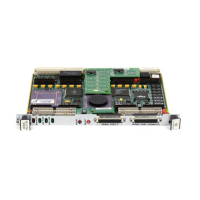MVME162 Functional Description
MVME162/D2 4-5
4
Battery Backed Up RAM and Clock
An MK48T08 RAM and clock chip is used on the MVME162. This chip
provides a time-of-day clock, oscillator, crystal, power fail detection, memory
write protection, 8KB of RAM, and a battery in one 28-pin package. The clock
provides seconds, minutes, hours, day, date, month, and year in BCD 24-hour
format. Corrections for 28-, 29- (leap year), and 30-day months are
automatically made. No interrupts are generated by the clock. Although the
MK48T08 is an 8- bit device, the interface furnished by the MCchip supports
8-, 16-, and 32-bit accesses to the MK48T08. Refer to the MCchip description
in Chapter 3 and to the MK48T08 data sheet for detailed programming and
battery life information.
VMEbus Interface and VMEchip2
The optional VMEchip2 provides the local-bus-to-VMEbus and VMEbus-to-
local-bus interfaces. The VMEchip2 can also provide the VMEbus system
controller functions. Refer to the MVME162 Embedded Controller Programmer’s
Reference Guide for detailed programming information. Refer to the MVME162
Embedded Controller Support Information manual for the pin assignments of
VMEbus backplane connectors P1 and P2.
Note that the
ABORT switch logic in the VMEchip2 is not used. The GPI inputs
to the VMEchip2 which are located at $FFF40088 bits 7-0 are not used. The
ABORT switch interrupt is integrated into the MCchip ASIC at location
$FFF42043. The GPI inputs are integrated into the MCchip ASIC at location
$FFF4202C, bits 23-16.
I/O Interfaces
The MVME162 provides onboard I/O for many system applications. The I/O
functions include serial ports, IndustryPack (IP) interfaces, and optional
interfaces for LAN Ethernet transceivers and SCSI mass storage devices.
Serial Communications Interface
The MVME162 uses a Zilog Z85230 serial port controller to implement the two
serial communications interfaces. Each interface supports CTS, DCD, RTS,
and DTR control signals as well as the TxD and RxD transmit/receive data
signals, and TxC/RxC synchronous clock signals. The Z85230 supports
synchronous (SDLC/HDLC) and asynchronous protocols. The MVME162
hardware supports asynchronous serial baud rates of 110B/s to 38.4KB/s.

